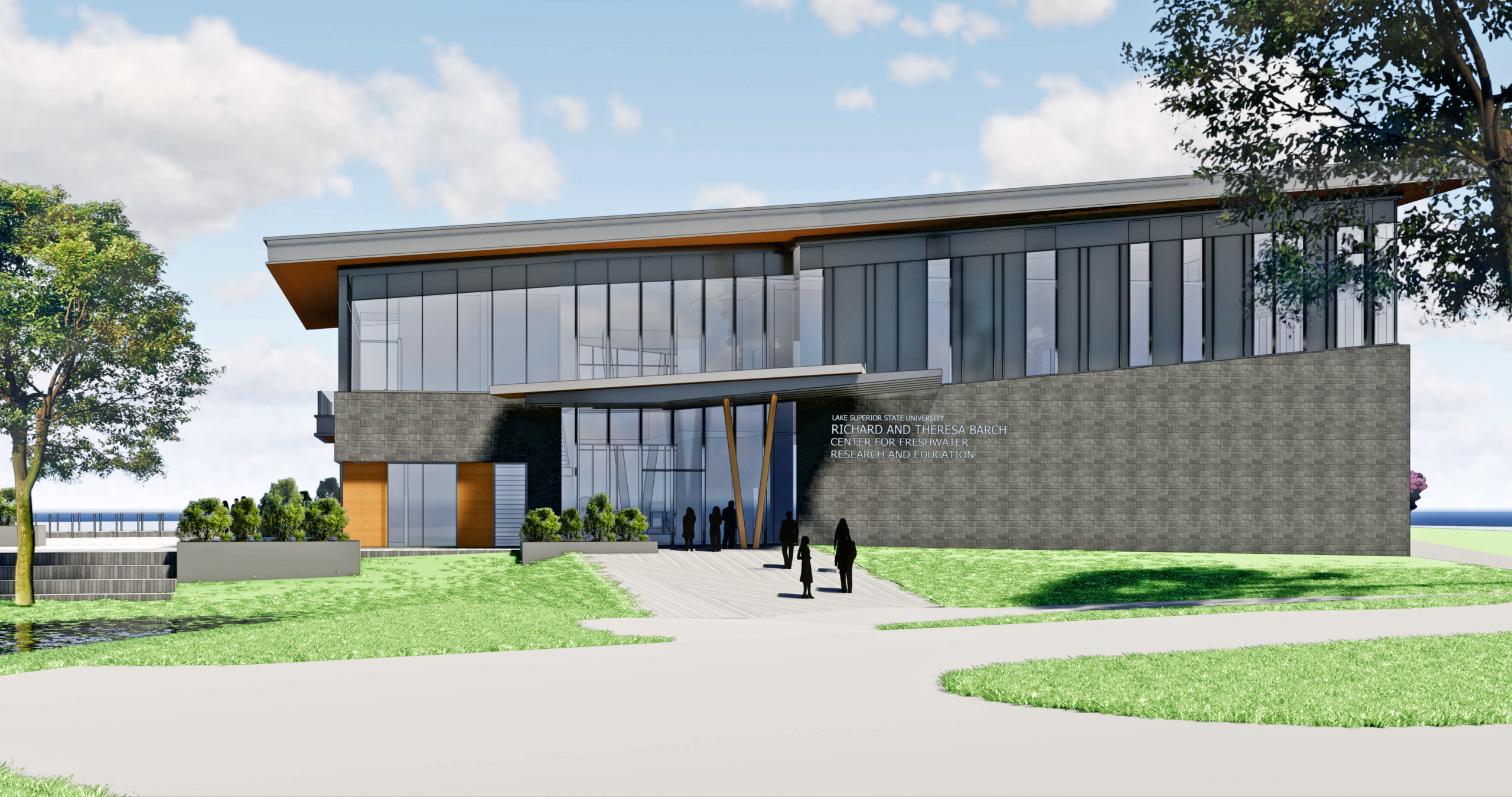Nov 22

Theresa and Richard Barch Building, Center for Freshwater Research and Education
A July 20 groundbreaking launches construction of a $13.2-million Center for Freshwater Research and Education, or CFRE, at Lake Superior State University. The ceremony is 12-1:30 p.m. outside of LSSU’s current Aquatic Research Laboratory (ARL), located on the east side of Cloverland Electrical Cooperative’s St. Marys River hydroelectric plant.
“Lake Superior State is the only university located at a nexus of three Great Lakes that represent nearly 20% of the world’s surface freshwater,” says LSSU President Rodney S. Hanley. “LSSU is uniquely positioned to build on freshwater education, science, and partnerships to ensure that the Great Lakes remain ‘great’ well into the future.”
The Center will integrate hands-on learning opportunities so LSSU students will not only gain knowledge in the lab and classroom, but apply that knowledge to real-world problems as they work side-by-side with educators and scientists.
“There are many threats to the Great Lakes that require large-scale research and educational collaborations to ensure we can manage and conserve fresh water,” says CFRE Director Ashley Moerke. “Threats to both water availability and quality are becoming more prevalent not just in our back yard in the Great Lakes, but across the globe. The Center for Freshwater Research and Education will be an indispensable tool for 21st Century education, research, and solutions.”
The threats are wide ranging and include increased demand from population growth, emerging contaminants such as cyanotoxins from algal blooms, and invasive species like quagga mussels and sea lamprey that have changed the Great Lakes food web. A wild card is changing climate that will impact everything from coastal properties to commercial and recreational fisheries.
Slated for completion by summer 2020, CFRE is actually two undertakings in one. LSSU’s existing ARL will remain open while being significantly renovated and expanded into a dedicated hatchery, while just to the east, a new two-story building will be built in what is now the city of Sault Ste. Marie’s Alford Park.
The new 17,500 square-foot building – named for project benefactors Richard and Theresa Barch – will anchor community, educational, and research activities. This includes a public Great Lakes Visitor Center that will be free and open to the public with interactive displays to highlight Great Lakes issues and LSSU research.
A Discovery Center will share space to focus primarily on educational partnerships and outreach targeted for prekindergarten through high school teachers and students. Plans are to staff it with LSSU teacher-education undergraduates who will work with area teachers to implement Great Lakes-themed curriculum, delivered at State standards. The Center will also host a career technology program in collaboration with the Eastern Upper Peninsula Intermediate School District (EUPISD).
Other Discovery Center ideas in the works include “road shows” offered by CFRE staff, Great Lakes “learning kits” loaned out to preK-12 teachers, teacher training programs, citizen-science programs offered either in person or delivered online, and community workshops based on Great Lakes issues.
Finally, the Barch building will contain start-of-art laboratories for experimental and analytical work conducted not only by LSSU undergraduate students and faculty, but guest students and scientists from universities and governmental agencies located throughout the Great Lakes and likely the world.
Projects will encompass areas including fisheries management, aquaculture, invasive species ecology, watershed management, the potential effects of climate change, and many more. CFRE will also be a ready resource for agencies responding to emerging contaminant issues such as oil spills, and harmful algal blooms.
The Center for Freshwater Research and Education builds on the robust 40-plus year legacy of LSSU’s Aquatic Research Laboratory, the functions of which will be rolled into, and enhanced, by CFRE.
The ARL was established as a testbed to raise various fish species and monitor water quality. In 1984 it began partnering with the Michigan Department of Natural Resources (MDNR) to raise Atlantic salmon, an effort that has become the lab’s major focus and a wonderful success story.
LSSU now annually stocks about 25,000 Atlantics into the St. Marys River. For the past five years, the ARL has provided the MDNR with 200,000-plus eggs annually to rear in their hatcheries and stock in other Lake Huron waters. Through egg production and direct rearing, now all Atlantic salmon in the upper Great Lakes originate from the ARL. LSSU supports a world-class fishing destination with an estimated $9-million impact on the regional economy.
Another ARL laurel lies in its education, research, and staffing of regional expertise.
Up to ten students are employed each year in the hatchery, while a similar number conduct undergraduate research. Since 2013, the ARL has partnered on at least $10 million in research funding. More than 3,500 visitors – from tourists to children’s groups – explore the hatchery each year.
About 40% of the Michigan Department of Natural Resources fisheries division’s workforce – and up to 70% of staff in the fish production division – are Lake State graduates.
Site preparation for CFRE begins in earnest this fall, with construction really kicking in next spring. LSSU is targeting a summer 2020 opening, and is looking forward to introducing a freshman class to the new facility in fall 2020.
CFRE operations, planning, and management during construction will be housed in Hillside Hall on LSSU’s main campus until the Barch building is ready for occupancy.
Joining Director Ashley Moerke as members of CFRE’s management team are Assistant Director of Research Kevin Kapuscinski, Interim Assistant Director of Education and Community Engagement Barb Light, and Interim Coordinator of Operations Ben Southwell. A Great Lakes education and outreach specialist will be selected before the end of summer.
Stay informed with project details and updates. Contact Tom Coates, executive director of the LSSU Foundation Office, to contribute to an ongoing capital campaign.